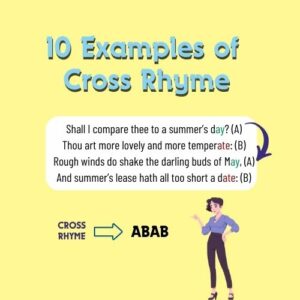The cross rhyme is a poetic technique where even verses rhyme with each other, and odd verses form their own rhyme. This pattern creates a distinct melodic quality in the poetry. It’s a technique widely used by poets to add a rhythmic and harmonious structure to their works.
Example 1 (Shakespeare’s Sonnet 18)
Table of Contents
- Shall I compare thee to a summer’s day? (A)
- Thou art more lovely and more temperate: (B)
- Rough winds do shake the darling buds of May, (A)
- And summer’s lease hath all too short a date: (B)
In this excerpt, verses 1 and 3 rhyme, forming one rhyme pair, while verses 2 and 4 create their own rhyme pair.
The Essence of Rhyme
At its core, rhyme is the repetition of the final sounds of words. For instance, words like “heart” and “part” rhyme because they share similar ending sounds. This repetition typically occurs when the sounds from the last stressed vowel onward coincide.

Cross rhymes often involve consonant sounds, where all or some sounds from the last stressed vowel coincide. Let’s explore some examples:
10 Examples of Cross Rhymes
Now, let’s delve into 10 examples of cross rhymes found in verses, poems, and songs by English-speaking writers:
- Excerpt from “Ode to the West Wind” by Percy Bysshe Shelley
- O wild West Wind, thou breath of Autumn’s being, (A)
- Thou, from whose unseen presence the leaves dead (B)
- Are driven, like ghosts from an enchanter fleeing, (A)
- Yellow, and black, and pale, and hectic red (B)
- Excerpt from “The Road Not Taken” by Robert Frost
- Two roads diverged in a yellow wood, (A)
- And sorry I could not travel both (B)
- And be one traveler, long I stood (A)
- And looked down one as far as I could (B)
- Excerpt from “The Rime of the Ancient Mariner” by Samuel Taylor Coleridge
- “Water, water, every where,” (A)
- “And all the boards did shrink;” (B)
- “Water, water, every where,” (A)
- “Nor any drop to drink.” (B)
- Excerpt from “She Walks in Beauty” by Lord Byron
- She walks in beauty, like the night (A)
- Of cloudless climes and starry skies (B)
- And all that’s best of dark and bright (A)
- Meet in her aspect and her eyes (B)
- Excerpt from “Elegy Written in a Country Churchyard” by Thomas Gray
- “The curfew tolls the knell of parting day,” (A)
- “The lowing herd winds slowly o’er the lea,” (B)
- “The plowman homeward plods his weary way,” (A)
- “And leaves the world to darkness and to me.” (B)
- Excerpt from “Jabberwocky” by Lewis Carroll
- ‘Twas brillig, and the slithy toves (A)
- Did gyre and gimble in the wabe; (B)
- All mimsy were the borogoves, (A)
- And the mome raths outgrabe. (B)
- Excerpt from “Annabel Lee” by Edgar Allan Poe
- “It was many and many a year ago,” (A)
- “In a kingdom by the sea,” (B)
- “But we loved with a love that was more than love—” (A)
- “I and my Annabel Lee—” (B)
- Excerpt from “The Raven” by Edgar Allan Poe
- Deep into that darkness peering, long I stood there wondering, fearing, (A)
- Doubting, dreaming dreams no mortal ever dared to dream before; (B)
- But the silence was unbroken, and the darkness gave no token, (A)
- And the only words there spoken were the whispered words, “Lenore?” (B)
- Excerpt from William Wordsworth’s “I Wandered Lonely as a Cloud”
- I wandered lonely as a cloud, (A)
- That floats on high o’er vales and hills; (B)
- When all at once I saw a crowd, (A)
- A host, of golden daffodils; (B)
- “A Red, Red Rose” by Robert Burns
- “O my Luve’s like a red, red rose,” (A)
- “That’s newly sprung in June;” (B)
- “O my Luve’s like the melodie” (A)
- “That’s sweetly play’d in tune.” (B)